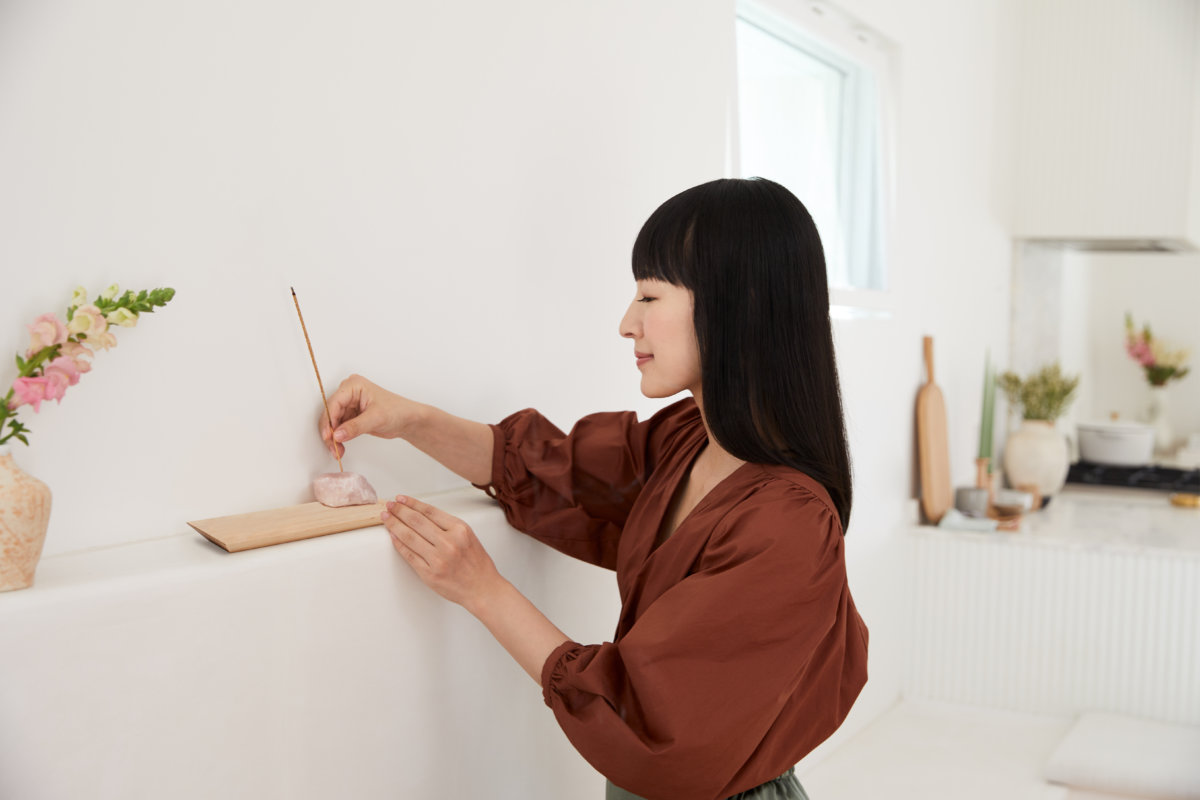When Marie Kondo introduced her notion of kurashi in late 2022, it represented a dynamic shift from focusing on tidying the home to how an organized life is, in its essence, self-care. Everyone’s ideal lifestyle will look different, but we can all benefit from choosing objects, relationships and rituals that spark joy.
That sounds beautiful, but what if you’re in a lifestyle rut? How do you start pursuing your ideal lifestyle when you’re unsure what you want or need?
We spoke with Stacy-Colleen Nameth, LCSW, a psychotherapist in Los Angeles who specializes in relational therapy with a body-mind focus, on the psychology behind living one’s ideal lifestyle — and how to embrace your kurashi even if your life isn’t quite where you want it to be.
Marie’s latest book encourages readers to imagine their “ideal lifestyle,” or kurashi, to help them prioritize how they spend their time. Is there an equivalent to this in psychology?
Kurashi seems to parallel the idea of visualizing what we want and need and imagining those concepts happening now. Being present with how we spend our time — and being curious and patient about what shows up without judgment — is mindfulness. I have found that living with intention, and supporting this approach with my clients, helps us all feel empowered and effective in our lives.
What are the pillars of a well-balanced life?
A sense of purpose, meaning, hope, agency and the resiliency to handle life’s ups and downs. Connection with self and others. Also, acceptance of moderation!
“We model to others how we want to be treated — if we don’t prioritize our wellness and well-being, we can’t expect or even hope that others will.”
What if I ask myself, “What is my ideal lifestyle?” and I don’t have an answer? Do you have any suggestions for someone struggling with direction in their life?
Most of us have examples of people living in a way that we admire or wish to have for ourselves. I often ask people to think of someone they know experiencing joy in their life. Then, I ask them to consider what makes this person feel this way. Is it their career? Their relationship? Their singleness? Living in a purposeful way that includes service or social activism? Forgiving others and accepting that folks are doing the best that they can?
You can start by looking for the feelings and experiences that they wish to replicate. If that feels too vast, I suggest starting with what you don’t want in your life (stress, financial worry, conflicted relationships, a missing spiritual connection, etc.).
Can we spend too much time imagining a different/better life? If so, what are some signs that we’re overdoing it?
Overdoing it would include ruminating and obsessing, fantasizing at the cost of being present in our lives, or even numbing out. That’s when it can become dangerous and disconnect us from taking action and the outcome we want.
What steps can we take to ensure self-care and prioritizing our mental health are a regular part of our daily lives?
Create a schedule that is doable with the time you have and doesn’t add more stress. Meditate for five minutes twice a day. Look away from the computer each hour. Laugh at silly videos. Move your body in ways that feel good and help with flexibility and strength. Accountability also helps — do those activities with others or check in regularly with someone else with the same goal.
Finally, check in emotionally and tune into yourself and your needs. Do a body scan for sensations and [practice] identifying what feels good, neutral, or bad. Talk with trusted friends or family or a therapist. We model to others how we want to be treated — if we don’t prioritize our wellness and well-being, we can’t expect or even hope that others will.
“We often sacrifice time by ruminating, getting distracted, or avoiding what scares or overwhelms us. Structure and organization can help us stay accountable and see things in a concrete way. ”
We live in a social-media-driven society — do you have any suggestions for pursuing a life that feels authentically your own without comparing yourself to others?
Remember that social media isn’t factual or accurate. People are presenting how they want to be seen in a purposeful way. That doesn’t always include an objective perspective. Take breaks from social media, limit your phone and apps, and ensure you’re practicing real social interaction. The pandemic has negatively affected our social skills, and we all have to practice talking to people in real time and showing our real selves so we can have real connections.
Is organization good for the mind?
Yes, for most people. Some are better at this skill, which is why it takes a village. We need to ask others who excel in this area to help those of us who struggle.
We often sacrifice time by ruminating, getting distracted, or avoiding what scares or overwhelms us. Structure and organization can help us stay accountable and see things in a concrete way. We need to be able to set time into our agendas for self-care, or it won’t necessarily happen. Even if a schedule or plan changes, we can adjust and practice flexibility, but it helps to see what we’ve accomplished each day so we can really see and sense that we are moving forward.
“Surrounding ourselves with smells, sights, tastes, textures and sounds that stimulate our sense of pleasure and ease will always benefit us. ”
Marie believes that objects spark joy. Is there something to this correlation — namely, that the objects around us can positively or negatively affect how we feel?
Absolutely! I’m looking at my office desk right now and see a beautiful green cactus, a candle that sounds and burns like a campfire, and a mug that I made in ceramics with my daughter. Each of these items brings me joy. However, the pile of paperwork next to them does not. Surrounding ourselves with smells, sights, tastes, textures and sounds that stimulate our sense of pleasure and ease will always benefit us.

